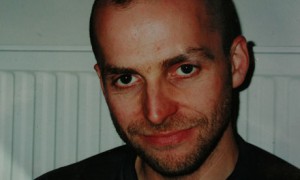What Next After Kate Wilson’s Landmark Spycops Ruling?
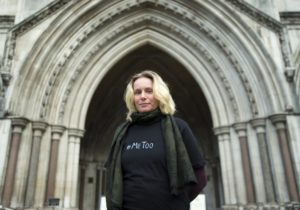
Kate Wilson outside the Royal Courts of Justice, 3 October 2018
Wednesday 3 October was one of the most extraordinary days in the eight gruelling years of convoluted legal cases by spycops victims.
Kate Wilson, deceived into a long-term relationship by undercover police officer Mark Kennedy, finally secured proof that managers sanctioned it, and saw the court order police to substantively respond to her claim at long last.
As a group accustomed to police stonewalling ahead of a day in court, biased judges in the courtroom, and empty hands as we leave the building, it was a startling relief.
The public inquiry, which is supposed to be independent investigation into acknowledged police wrongdoing, has lost the faith of victims because it protects officers who committed perjury, sexually abused women and undermined democratic organisations.
And yet last week’s hearing at the Investigatory Powers Tribunal – special secret courts the adjudicate on matters of state surveillance – gave the Met short shrift and ordered them to produce witness statements responding to the facts of the case so that the Tribunal can establish what happened and who knew.
The myth of rogue police officers
The Met’s extensive self-investigation into spycops, Operation Herne, was unequivocal. In 2014 they issued a report telling us:
‘There are and never have been any circumstances where it would be appropriate for such covertly deployed officers to engage in intimate sexual relationships with those they are employed to infiltrate and target.
‘Such an activity can only be seen as an abject failure of the deployment, a gross abuse of their role and their position as a police officer and an individual and organisational failing.’
We now know this is not true.
Kate Wilson was given a 200 page sample of the 10,000 pages of documents containing her name that the Met admit to holding. They show Mark Kennedy’s managers were well aware of the extent of his relationship with her, right down to details of him cleaning her mum’s windows. They authorised payments – from the public purse – for him to buy her gifts.
It’s the latest U-turn in a long trail of police dodging disclosure and accountability. Wilson was one of eight women who brought a legal claim in 2011.
The Met initially suggested the women should instead sue the individual spycops in the relationships. They were rogue officers, the women were told.
‘It is absolutely not authorised… It is never acceptable under any circumstances… for them to engage in sex with any subject they come into contact with’
– Chief Constable Jon Murphy, spokesperson for the Association of Chief Police Officers which ran Mark Kennedy’s National Public Order Intelligence Unit.
But the patterns of the relationships with so many women over several decades were so similar it was patently clear that this was strategy and training. There is nothing Mark Kennedy did as a police officer that wasn’t done by dozens before him. Far from being rogue, he was textbook.
Unauthorised authorisations
The women noted the police’s contention that relationships weren’t authorised, and that it meant the case would be heard in open court, rather than the secretive Investigatory Powers Tribunal (IPT) that deals with authorised state surveillance.
The police baulked at this and, less than a year after telling the court the relationships were unauthorised, the same Met lawyers were back in the same courtroom saying of course the relationships were authorised, and therefore the case should go to the secretive IPT where complainants are barred from court and don’t see the evidence against them.
The police lawyers pointed out that the Regulation of Investigatory Powers Act 2000 authorises ‘personal and other relationships’.
The word ‘other’ might imply non-personal, such as business relationships, but the dictionary definition encompasses literally all kinds of relationship. Because of this, the Met said that any relationship – even years spent as a co-habiting lifepartner integrated into a family – can be regarded as included and would therefore be authorised and legal.
This argument is why Kate Wilson has ended up at the IPT and not in a normal court.
What is the Investigatory Powers Tribunal?
The IPT was set up under the Regulatory of Investigatory Powers Act 2000 (RIPA). The government realised that state surveillance could breach human rights, but didn’t want complaints dealt with in open court for reasons of security.
The IPT is a bizarre institution. Most of its hearings are held in secret. At these, the citizen complaining isn’t allowed to attend. Neither are their lawyers. They just get to effectively shove their papers under the door.
The state spies, however, are in court. The complainant doesn’t get to see what’s in the MI5/police papers, so they can make anything up about the complainant, or omit anything that is unhelpful to the security services’ case. The judges look at both sets of papers, talk to the spies, then make a judgment.
They only announce who has won. They do not explain their reasoning, nor even confirm that any spying ever took place. The complainant cannot appeal against the judgment.
We don’t know how many cases they hear, but looking at the annual reports of the
Interception of Communications Commissioner, between 2000 and 2011 there were at least 1,300. Of these, just 10 complaints – less than 1% – were upheld.
They have held Kate Wilson’s preliminary hearings in public, which bodes well for access to hearings in the rest of her case.
Police obstructing justice
The police, true to form, have tried to get out of disclosing documents with any argument that comes to hand. At the last hearing, they said that there’s no need to give Kate the 10,000 documents they have on her as they have already admitted that her human rights were breached.
They’ve previously used compensation to fob off similarly deceived women who would have preferred ‘less money and more truth‘. By the same token, this case is not about stopping at abstract admissions. It is about knowing the facts of what happened, how extensive the surveillance was, why it was authorised, who knew, and then holding those responsible accountable for their actions.
It’s a safe bet the other women abused by spycops were monitored and documented to the same degree. They too deserve real answers – all the women affected should be given their full, unredacted files so they can judge for themselves what went on rather than trusting the police who abused them to make redactions.
If had been found to be, say, a secret medical unit that had been abusing citizens for decades, it’s unthinkable that the doctors involved would be protected from scrutiny and prosecution. The exceptionalism expected by police – and too often granted to them – is utterly extraordinary.
An organisation interested in justice would want those who abuse power rooted out. Instead, the police commit a second injustice against the victims as they close ranks around miscreants, doing all they can to stymie efforts to get to the truth.
Kate Wilson’s case against the police
Wilson’s civil case with seven other women ended in 2015 with an unprecedented apology from the Met which plainly asserted:
‘sexual relationships between undercover police officers and members of the public should not happen. The forming of a sexual relationship by an undercover officer would never be authorised in advance nor indeed used as a tactic of a deployment.’
The new release of 200 pages from her files demolishes that. As Wilson wrote in The Guardian:
‘I was lied to by the police in a public apology that was supposed to be reparation for their deceit and abuse.
‘Now I really want answers. I want to know how high up the police hierarchy knowledge of the abuses went. I want access to the 10,000 documents they claim to hold on me, and to know why at least eight police officers were sent to deceive me and spy on every area of my life.
‘I want the court to examine the institutional sexism and political prejudices that informed the decisions they made, and to look at the legality of the operations and the inadequate laws that are supposed to protect our human rights.’
Wilson’s IPT case asserts that the police breached a number of her rights under the European Convention on Human Rights.
The police have already conceded that they violated Articles 3 and 8.
Article 3 – the right to freedom from torture, inhuman or degrading treatment – is a fundamental right; there are no circumstances in which it is acceptable to breach it. Since 2002, the constable’s oath taken by every new officer includes swearing to ‘uphold fundamental human rights’.
Article 8 – the right to a private and family life – is qualified. It may be breached for some reasons, for example for national security. The police have said this threshold was not reached in Wilson’s case. They admit that her activities were not a threat to the public and did not warrant such intrusion, which undermines the ‘eco terrorist domestic extremists’ line the police have been pushing to the Undercover Policing inquiry and elsewhere.
Taken together, these are already huge admissions with major implications for the efforts of other spycops’ victims seeking the truth about what was done to them.
She also claims they violated Article 10 (freedom of expression), Article 11 (freedom of association), and Article 14 (freedom from discrimination). The police still haven’t answered these.
What next for Kate Wilson’s case?
At a hearing a year ago the police were told to disclose their documents. They have failed to do this (again, this has been a standard delaying tactic over the last eight years).
The police told the court it would be expensive and Met funds are finite; these words came from the mouth of the fifth new lawyer for the police in the past six years, as the police have dragged out Wilson’s claim since 2011, seemingly having no problem finding funds for devious vexatious attempts to strike out the case and avoid accountability.
‘It’s expensive to comply with the law so we won’t’ isn’t a convincing argument from anyone, least of all those who are supposed to enforce it. The fact that it’s a big job makes it more important, not less. They systematically abused citizens for decades. The public deserve answers.
The Met told the court that they still regard Kennedy’s actions – which they admit breach the Human Rights Act – as properly granted and fully lawful.
They also argued that the Undercover Policing Inquiry could do the job of investigation. Even if we ignore the fact that it has turned into a secret public inquiry, gullibly believing the proven liars who are its subject whilst treating victims with suspicion and disdain, it is optimistically predicting that the public will see its report in 2024, six years away and 14 since Wilson discovered the truth about Kennedy.
The court was having none of it. It gave the police three months to provide witness statements with supporting evidence and a fully pleaded defence of their case. Then it went further, requesting that all relevant authorisations and the intelligence that led to those authorisation requests in the first place be explained and provided to the Tribunal, in order to assess whether the operations were lawful at all.
What the court does after that is uncertain. We have no guarantee that we will see any of the material. But if we were finally on the road to truth and justice, this is what it would look like.

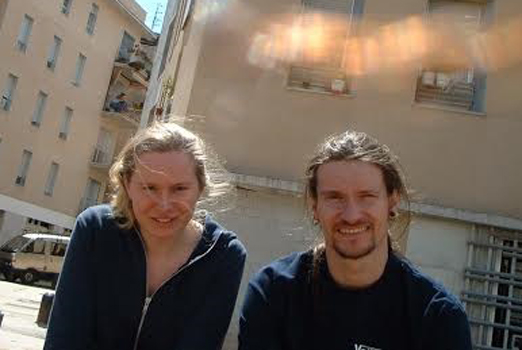
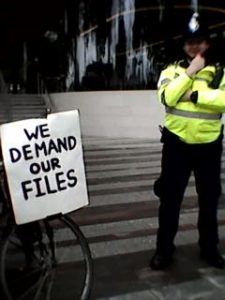 Kate’s human rights claim is being heard by the
Kate’s human rights claim is being heard by the 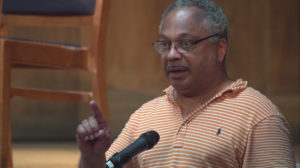
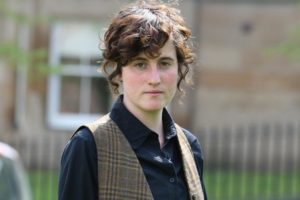
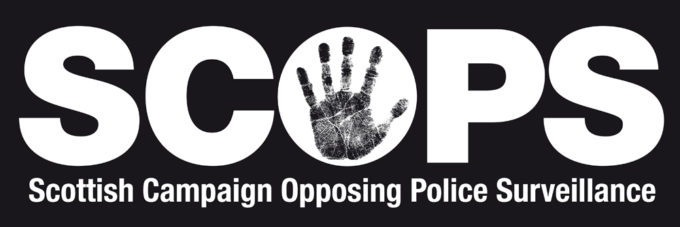
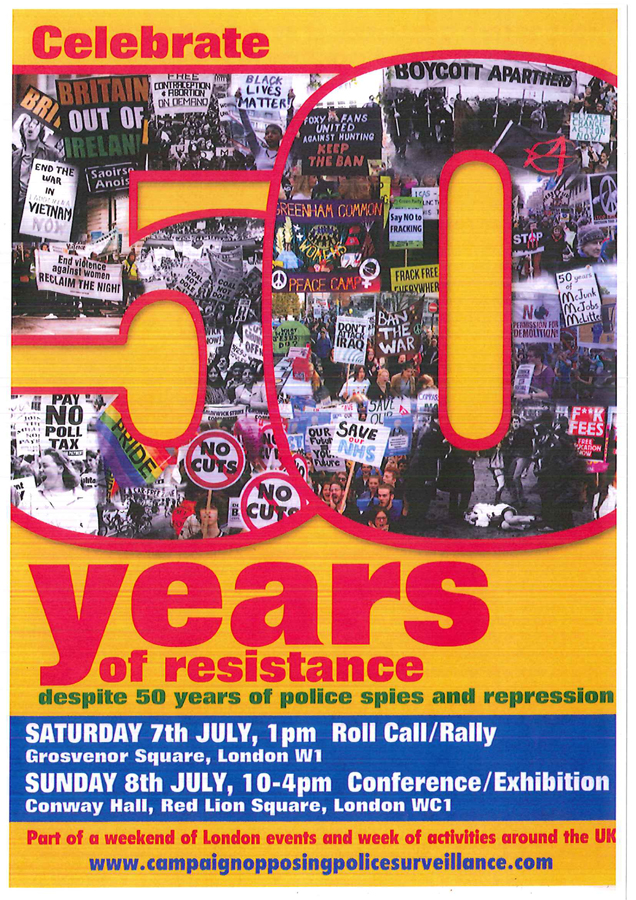
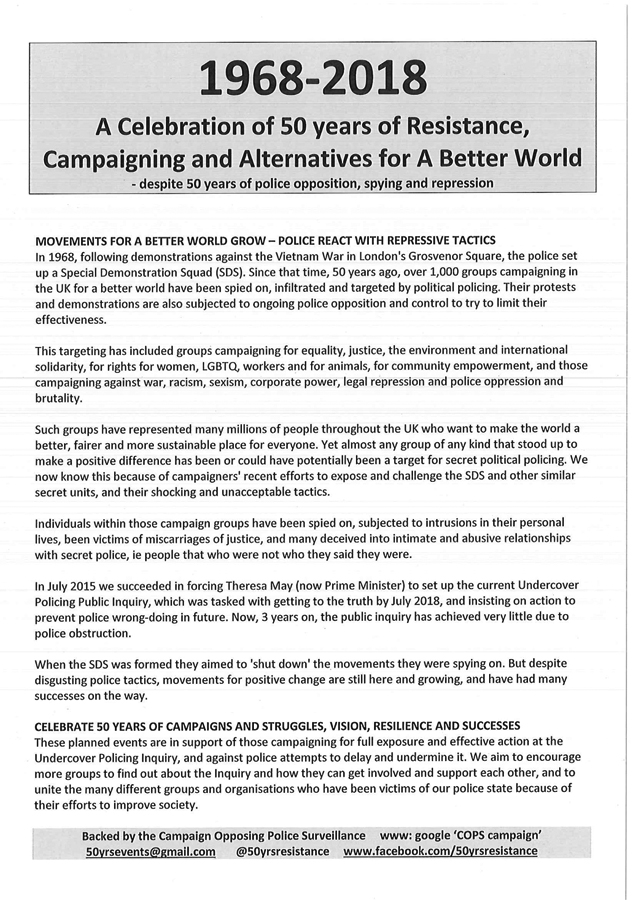
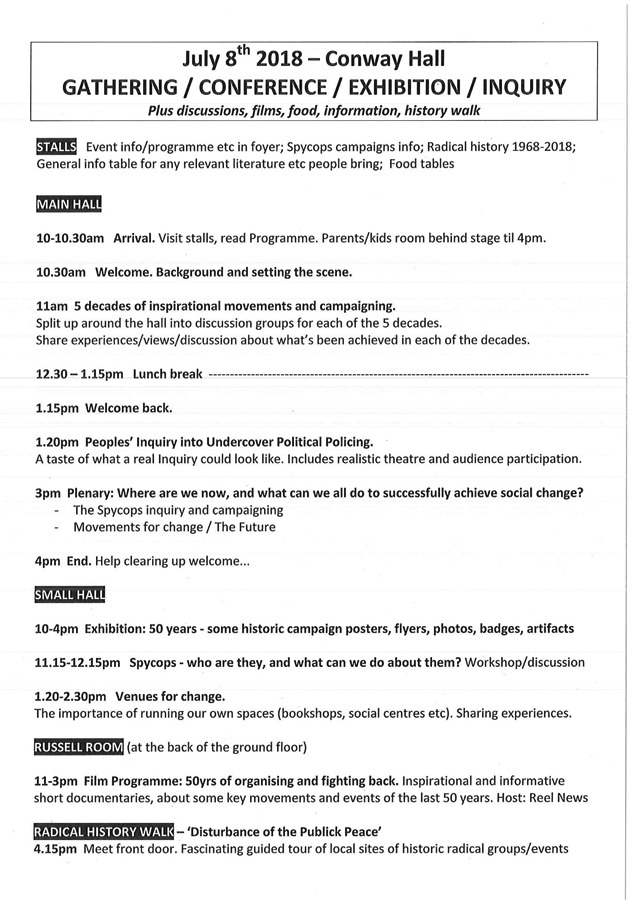
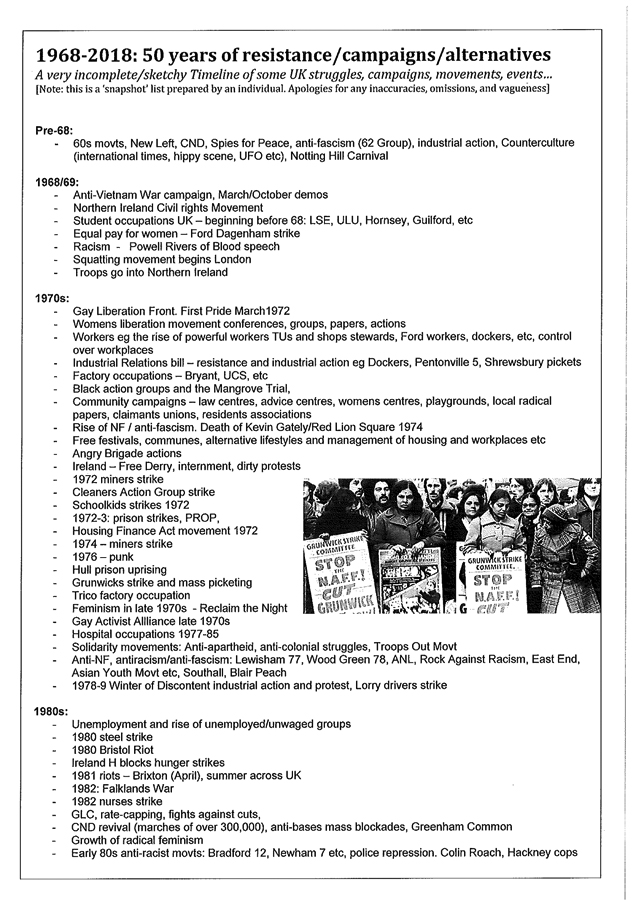
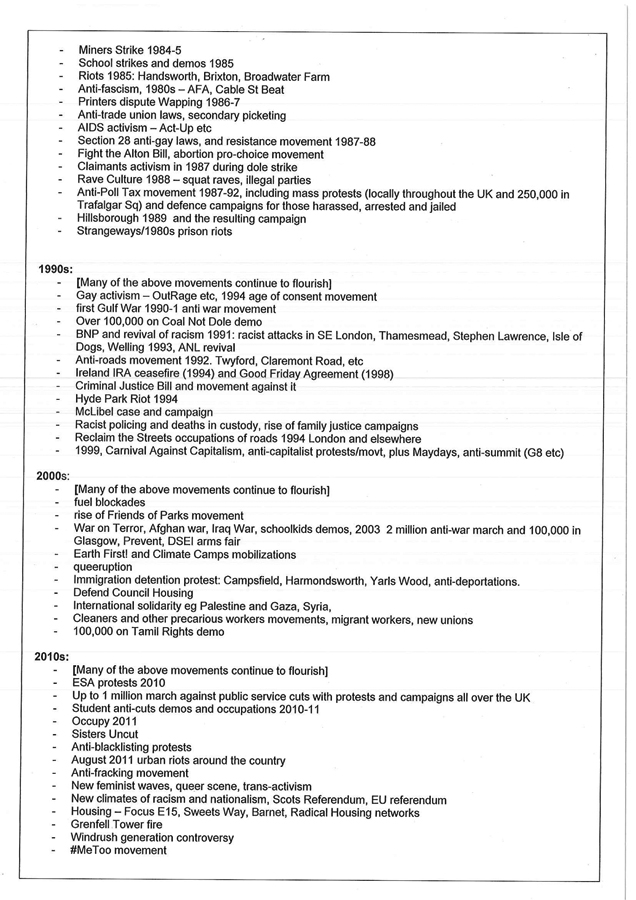
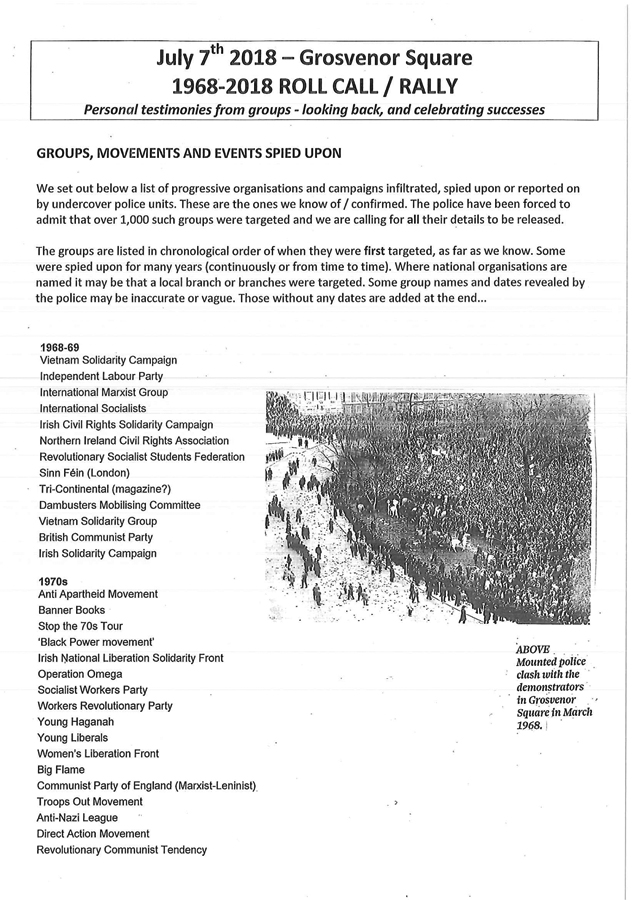
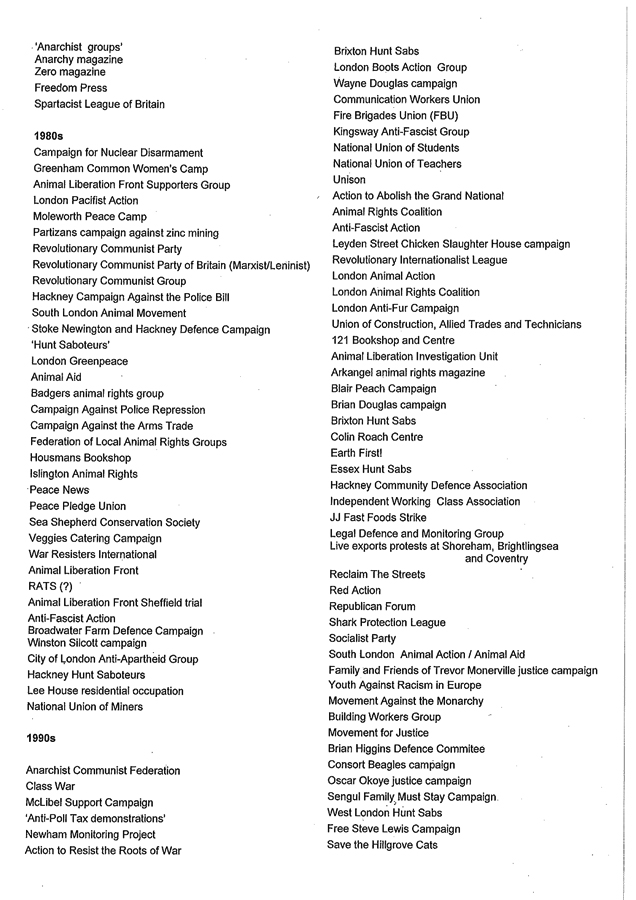
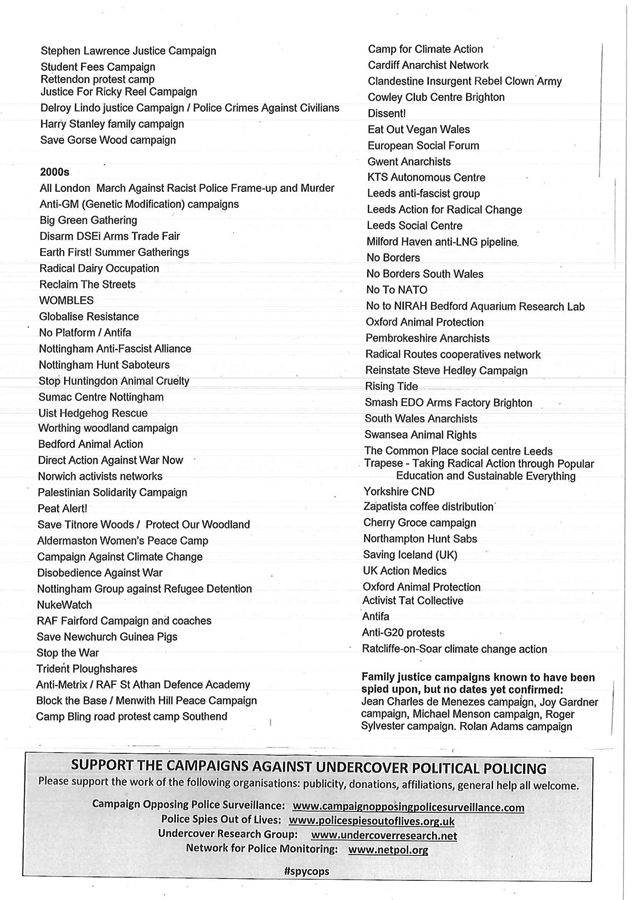
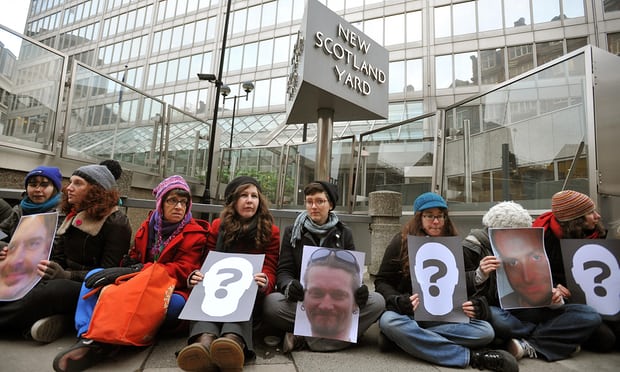
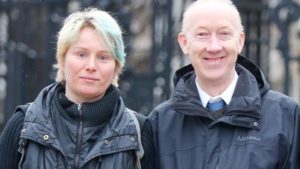
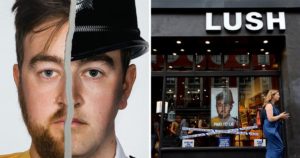 Nobody thought that sort of thing happened in this country. For 40 years, the public were unaware of secret police units dedicated to infiltrating and undermining a swathe of political groups.
Nobody thought that sort of thing happened in this country. For 40 years, the public were unaware of secret police units dedicated to infiltrating and undermining a swathe of political groups.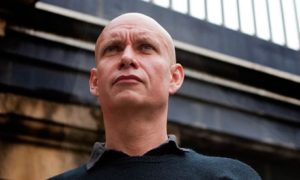
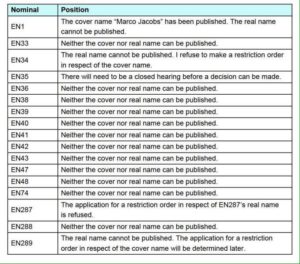
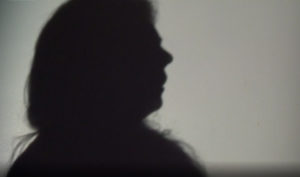 A woman who was deceived into a relationship by an undercover police officer is bringing a legal case to have him charged with Misconduct in Public Office as well as sexual offences, including rape.
A woman who was deceived into a relationship by an undercover police officer is bringing a legal case to have him charged with Misconduct in Public Office as well as sexual offences, including rape.